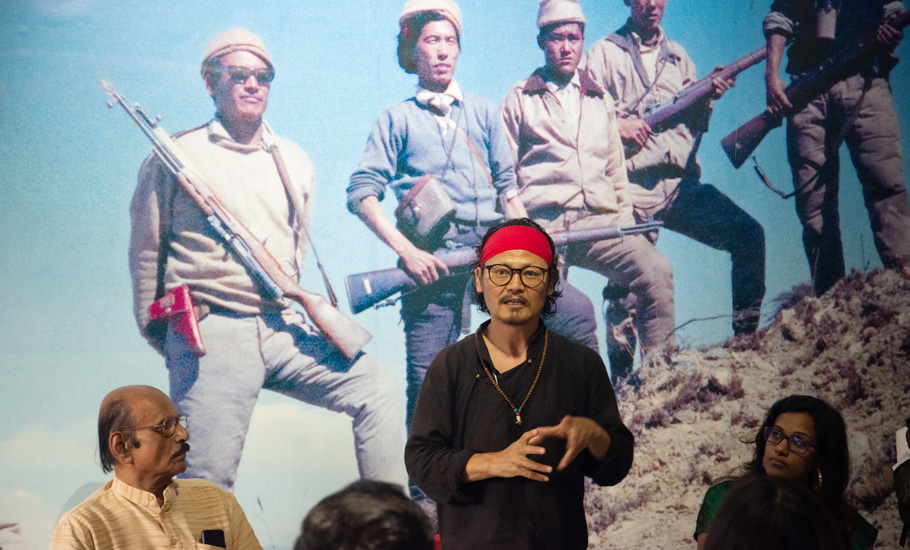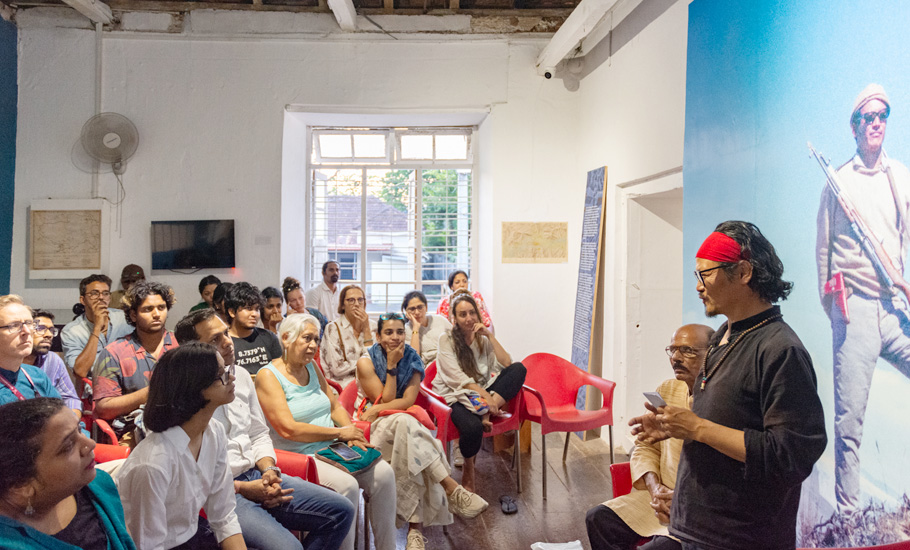
- Home
- News
- Analysis
- States
- Perspective
- Videos
- Education
- Entertainment
- Elections
- World Cup 2023
- Features
- Health
- Business
- Series
- Economy Series
- Earth Day
- Kashmir’s Frozen Turbulence
- India@75
- The legend of Ramjanmabhoomi
- Liberalisation@30
- How to tame a dragon
- Celebrating biodiversity
- Farm Matters
- 50 days of solitude
- Bringing Migrants Home
- Budget 2020
- Jharkhand Votes
- The Federal Investigates
- The Federal Impact
- Vanishing Sand
- Gandhi @ 150
- Andhra Today
- Field report
- Operation Gulmarg
- Pandemic @1 Mn in India
- The Federal Year-End
- The Zero Year
- Premium
- Science
- Brand studio
- Home
- NewsNews
- Analysis
- StatesStates
- PerspectivePerspective
- VideosVideos
- Entertainment
- ElectionsElections
- Sports
- Loading...
Sports - Features
- BusinessBusiness
- Premium
- Loading...
Premium

Beaten, tortured, jailed: Why Tenzin Tsundue can’t stop writing and speaking of a Free Tibet

“When I was born, my mother said, ‘you are a refugee’. Our tent on the roadside smoked in the snow… “ Tenzin Tshundue, who was born to a Tibetan couple who worked on India’s border roads in Manali in 1975, wrote thus in his poem ‘Refugee’. Growing up in a tiny rented house far from his Himalayan country, Tenzin first experienced the crisis of identity when he was sent to a...
“When I was born, my mother said, ‘you are a refugee’.
Our tent on the roadside smoked in the snow… “
Tenzin Tshundue, who was born to a Tibetan couple who worked on India’s border roads in Manali in 1975, wrote thus in his poem ‘Refugee’.
Growing up in a tiny rented house far from his Himalayan country, Tenzin first experienced the crisis of identity when he was sent to a nearby school. He felt that he was ‘neither here nor there’. The realisation of a refugee, however, helped. It was from this sense of vacuum that he picked up the alphabets of freedom. Tenzin took a pledge to liberate Tibet, his country, from the Chinese occupation, when he was barely 11 years old.
Lying on the Tibetan plateau in the Himalayas, Tibet was a peaceful, independent country until it was invaded by China in 1949. The hill country’s spiritual head Dalai Lama was forced to seek asylum in India in 1959. Many Tibetans left the country due to the brutal and stringent policies of the Chinese government. But Tenzen wanted to do something for his country and its people.
To begin with, he used poems as a weapon to question the establishment. He published his first collection of poems Crossing the Border in 1999. It was after he joined Friends of Tibet, a people’s movement aimed at ending China’s occupation of Tibet and the suffering of the Tibetan people, that he could strengthen his fight. Tenzin grabbed the limelight in January 2002 when he unfurled a ‘Free Tibet: China, Get Out’ banner and a Tibetan flag by climbing the scaffolding outside the hotel in Mumbai where Chinese Premier Zhu Rongji stayed. In 2021, he walked through the Himalayas, starting from Ladakh in the west and ending in Arunachal Pradesh in the east.

Tenzin was arrested by China’s border police when he travelled to Tibet in his early 20s.
But how do poems and travels help as modes of resistance?
“The young man who climbed the Oberoi Hotel tower unfurling a Free Tibet banner down its facade while the Chinese Prime Minister was addressing a meeting was born a refugee, and at 11 he took a pledge to liberate his country. He had long before started his fight, and even sneaked into Tibet, alone, to fight China. Of course, then, the romantic-idealist rebel was quickly arrested, beaten, tortured and jailed in Tibet by Chinese security forces. For me, freedom is the inspiration, poetry, my language and resistance, my action. Together they make revolution,” said Tenzin, who was locked up in prison in Lhasa for three months and later ‘pushed back’ to India. He was arrested, detained by the Indian police more than 10 times.
Walking the Himalayas was an ambitious personal exploration and spiritual reconnection with the hundred different communities in the Indian Himalayas. In 2021, Tenzin covered the tour in five legs:
1) Ladakh- Leh, Choglamsar, Nubra, Kargil, Zanskar
2) Himachal- Lahaul, Spiti, Kinnaur
3) Uttarakhand- Kumaon and Garhwal
4) Kalimpong, Darjeeling and Gangtok
5) Arunachal- Bomdila, Tawang, Itanagar
“This tour that spanned between August and December in 2021 gave three main perspectives and understanding of the culture, history and contemporary challenges in the area that there has been a cultural partition in the Himalayas because of Chinese invasion of Tibet, that among the disparate cultures, language and ethnicities there is still a pan-Himalayan perspective possible, and lastly the physical Himalayas are still rising, and the people and culture and politics are reshaping the Himalayas so much so that it may go unrecognisable in 50 years,” said Tenzin, who was in Kochi for ‘Let’s Talk’, an interactive poetry reading session organised by Kashi Townhouse, a Kochi-Muziris Biennale Invitations Programme.
Tenzin said in Kochi that while he was living in a refugee camp on the edge of the Sathyamangalam forest, his life was filled with vivid images of Tibet (its snow mountains, apples, peaches, apricots). This may be true in the case of other Tibetan refugees as well. Tenzin has been a symbol of resistance when it comes to the Tibetan freedom struggle. The journey is long, and does he see light at the end of the tunnel? “Industrial revolution has created fetish for success; raising the flag, marking the borders, parading an army, inaugurating a statue, but the main nation-building is the struggle itself, the process. It is during the freedom struggle that a nation is dreamed and designed and it becomes how you make it during the struggle period,” he said.
“The proverbial ‘light at the end of the tunnel’ assumes an inevitable moment of hope, but in reality, a struggle doesn’t come with such a package, one must work for it with suffering and sacrifice. The ‘light’ is the torch that you bear in your journey, there is no saviour out there. As for Tibet, we have always placed our faith in the truth and never wavered from our path of nonviolence. We will get there.”
Tenzin doesn’t know when he can return to his country, but he is sure about one thing: “Independence is only a status that is different from freedom. When it comes to the Tibetan freedom movement, we know that it may take time but we are confident. Be it 50 or a 100 years, we will continue to fight. We also know that we are not going to lose anything anymore and we will return to Tibet,” said Tenzin, who is the author of Kora (collection of stories and poems) and Semshook (essays on Tibetan freedom struggle). China’s occupation of Tibet, according to Tenzin, was for a false nationalism. “Today, China feeds itself with resources mass-extracted from its occupied countries which actually makes up 60% of its 9.6million sq km of land. This contraption colonial empire running in the name of communism is a postmodern dictatorship. There is no future for it,” added the wandering poet-activist.
Tenzin’s petitions to the Indian Prime Minister Narendra Modi to repeal ‘One-China policy’ evoked tremendous response. He walked from Dharamshala to Delhi in 2021 to highlight the issue. “India hasn’t dramatically changed its policies towards China even after the Galwan Valley Massacre and the Covid, but definitely changed its postures – the trading partner is now being seen as a military threat– and that’s a major shift in three years. Without resolving the Tibet issue, India cannot continue to face China as a threat forever. Tibet is the solution for the long-term security interest of India,” said Tenzin.

